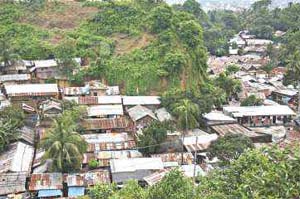Authorities yet to take any effective action to remove houses from Ctg hills despite fatal landslides every monsoon
 Though monsoon is knocking on the door, the authorities concerned have yet to take any effective step to evacuate thousands of people living on the slopes of hills in Chittagong city with the risk of being victims of landslides.
Though monsoon is knocking on the door, the authorities concerned have yet to take any effective step to evacuate thousands of people living on the slopes of hills in Chittagong city with the risk of being victims of landslides.
The Hill Management Committee (HMC) tables proposals for evacuation and rehabilitation before monsoon every year, but usually very little is done. The committee was formed following a devastating landslide that left 127 people killed on June 11, 2007.
On July 1 last year, 17 people were killed in a landslide. Many slums have been developed on the slopes of hills where low-income group people — garment workers, rickshaw pullers, and day labourers — are residing. Politically blessed locally influential quarters have built the slums on government lands and rented those out.
Many people are living on the risky hill slopes at Motijharna, Batali Hill, Tiger Pass, Ambagan, Lalkhan Bazar, and adjacent areas in the city.
The residents are living in fear of another probable devastating incident during heavy or incessant downpour in the upcoming rainy season.
Sirajul Haque Khan, president of HMC, told The Daily Star that they met with officials of government bodies concerned to discuss the matter at Chittagong city’s Circuit House on May 9.
All hill owners were directed to take steps for evacuating people from the risky slopes gradually before the monsoon, he said.
On July 7 last year, the committee, in another meeting, directed the hill owners to make lists of people living in risk on the hills within 15 days.
But only three organisations — Chittagong City Corporation, AK Khan Co Ltd, and James Finlay Bangladesh — and an individual owner Mir Mohammad Hasan made the lists and provided those to the committee.
No government organisation provided any list, said Sirajul Haque.
Asked about their earlier initiatives to evacuate the families from the hills, Sirajul said, “As the people residing there are very poor, they often return to the same places after evacuation drives.”
“The problem cannot be solved without permanent rehabilitation of the people,” he said.
Tragic incidents could be avoided, if the organisations and institutions concerned took initiatives to remove the illegal structures on the hills, he said.
According to a document of HMC obtained by The Daily Star, the committee headed by the divisional commissioner also took many short and long term plans in 2007.
The committee identified 12 hills as risky. It suggested declaring the risky areas as “Red Zones”, and afforestation of those areas after relocating the residents to suitable places. It also put forward 36 proposals including construction of retaining walls to prevent landslides, and discouraging people from living on the slopes of hills.
The risky hillsides and valleys are — Batali Hill, hill at Motijharna area, Tiger Pass Hill, hill adjacent to CDA Avenue, Lake City Residential Area hill, VIP Hill, hill at Chittagong University, hill of Jamiatul Ulama Islamia Madrasa authority, hill adjacent to northern side of Forest Research Institute, James Finley Hill at Chatteswari Road, AK Khan Hill, and Nasirabad Properties Hill, according to the document.
Sources at the Department of Environment (DoE) said the department suggested that the committee enlists two more hills as risky this year, which are Kaiballay Dham Pahar, and BSC Pahar at Kaiballay Dham.
Different government, autonomous and private organisations, and individuals — Public Works Department, Bangladesh Railway, Chittagong Wasa, Chittagong City Corporation, Chittagong University, AK Khan Group, Ispahani Group, James Finley, Mir Mohammad Hasan, Md Harun Khan, Jameyatul Ulum Madrasha owned by Mufti Izhar, and Syed Ziad Hossain — own the hills.
Fayez Ahmed, deputy commissioner of Chittagong, said, “We directed the law enforcers to take actions against illegal grabbers and local influential quarters who are making slums on the risky hill slopes owned by government organisations.”
“Around 800 to 1,000 families are living on the hills owned by the Railway, PWD and Wasa,” he added.
Fayez said they took initiative to rehabilitate the residents in safe places by providing financial help of Tk 1,000 to Tk 1,200 to each family from the fund of the district administration.
“But very few showed interest to take the help,” the DC said.
Courtesy of The Daily Star




















